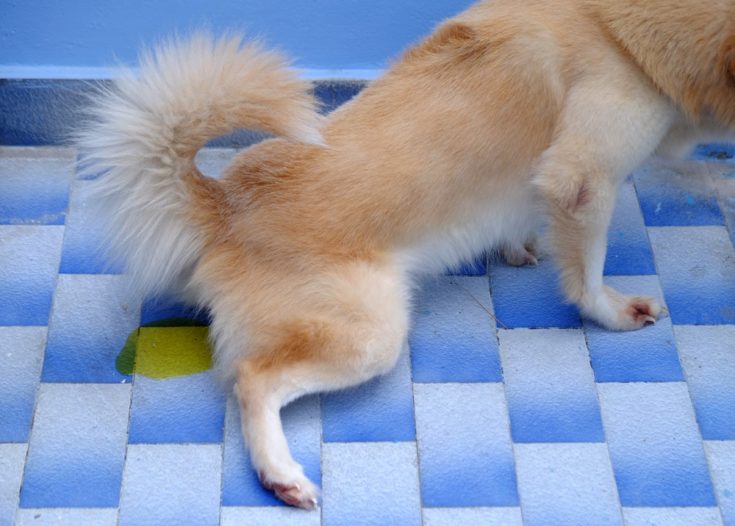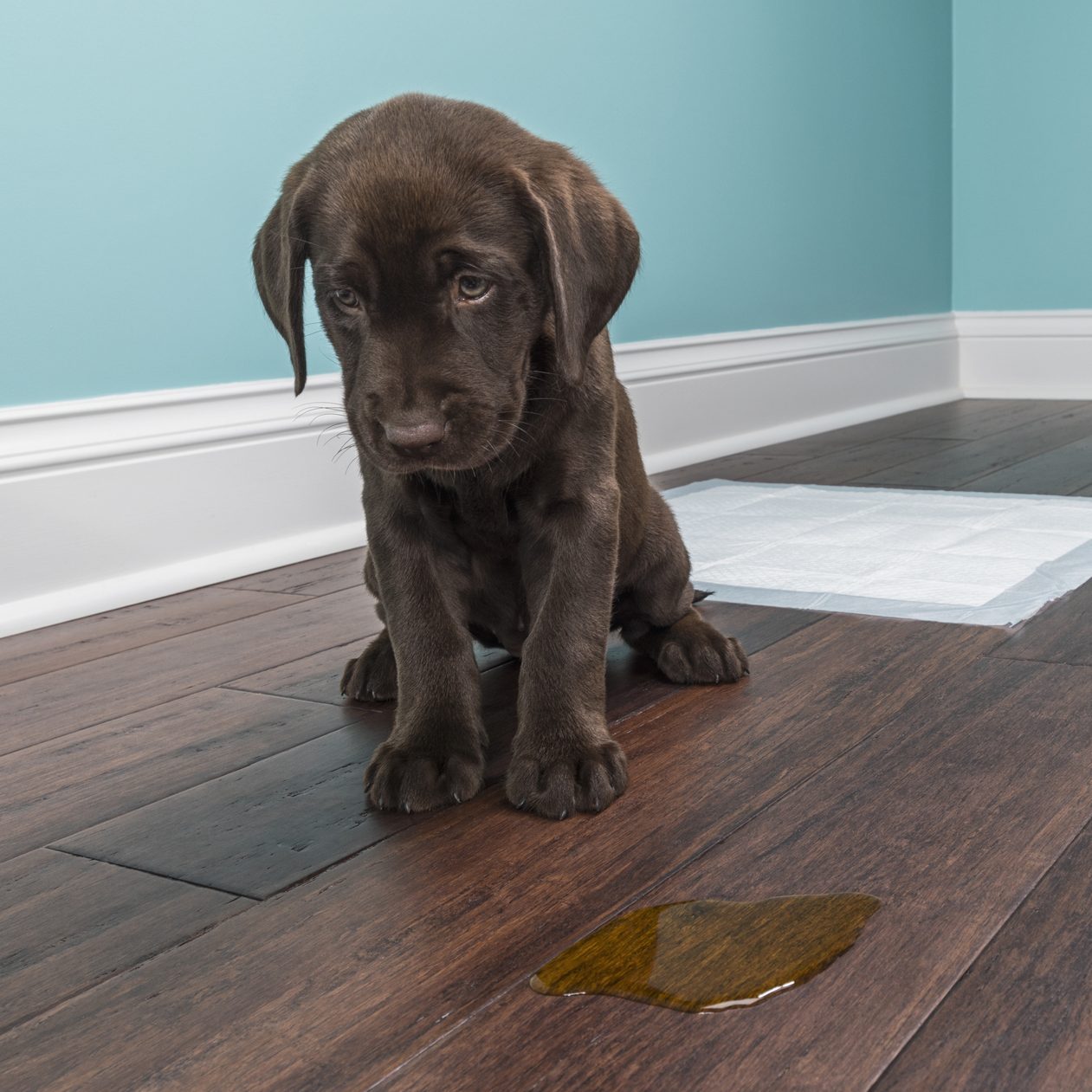It’s a scene every dog owner dreads: you come home to find a wet spot on your rug, the telltale sign of an accident. It’s even more worrisome when your previously house-trained dog starts peeing indoors seemingly out of the blue. This change in behavior begs the question: why is my dog suddenly peeing on the floor? The answer, thankfully, usually isn’t a deliberate act of defiance; rather, it’s often a symptom of something deeper, something that needs your attention and understanding.

Image: animalia-life.club
Witnessing this sudden change can be disheartening, especially if you’ve been enjoying years of comfortable house-training. But remember, your furry friend isn’t trying to punish you; they’re likely experiencing discomfort or distress. This is not only a common occurrence, but also an invitation to investigate what might be causing the change. So, let’s delve into the possible causes behind this behavior and explore solutions to help your dog regain control over their bladder.
Understanding the Underlying Causes of Accidental Urination
Finding out why your dog has started peeing in the house is the first step to successfully addressing the situation. It’s important to rule out medical causes first, as these are often the most significant contributing factors. A sudden change in bathroom habits can be a symptom of a variety of health issues.
Medical Considerations: When to Seek Veterinary Guidance
Firstly, it’s crucial to eliminate any medical issues that might be affecting your dog’s bladder control. A sudden onset of incontinence could be a sign of a urinary tract infection (UTI), kidney problems, or even diabetes. These conditions can cause pain, discomfort, and an inability to hold their urine.
If your dog is exhibiting any of these symptoms alongside the accidents, a veterinary visit is essential:
- Frequent urination
- Straining to urinate
- Blood in the urine
- Lethargy
- Loss of appetite
- Excessive thirst
Behavioral Factors: Understanding Your Dog’s Communication
Once medical issues have been ruled out, it’s important to consider behavioral reasons. Just like humans, dogs can experience stress and anxiety, which can manifest in unwanted behavior. Some common triggers for accidental urination include:
- Stressful events: Moving to a new home, changes in routine, the arrival of a new family member, or even a particularly loud thunderstorm can trigger stress in dogs.
- Anxiety: Separation anxiety is a frequent culprit for accidents, especially while owners are away.
- Territorial marking: Dogs may urinate in specific spots to mark their territory, especially if they feel threatened or insecure.

Image: telegra.ph
Age-Related Considerations: Recognizing the Signs
As dogs age, their bodies can undergo natural changes that might affect bladder control. Age-related incontinence is common and often due to weakening of the muscles involved in urine retention. This issue can be exacerbated by medical conditions like arthritis, which can make it difficult for older dogs to get to their designated potty spots.
Environmental Changes: Examining Your Dog’s Living Environment
Changes to a dog’s environment can also lead to accidents. For example, if you’ve recently changed litter boxes or moved their bed, your dog may be disoriented and unable to find their designated toilet area. Additionally, if their preferred bathroom spot is no longer accessible due to renovations or other changes, they may resort to peeing in the house.
Addressing Accidental Urination: Strategies for Success
Once you’ve identified the possible cause of your dog’s accidents, you can implement strategies to correct the behavior. It’s important to be patient and consistent, as it may take time for your dog to adjust.
Medical Solutions: Management and Treatment
If medical conditions are identified as the cause, your vet will recommend appropriate treatment, such as medication for UTIs or specialized diet for kidney disease. For age-related incontinence, there are a variety of medications and management strategies available to help improve bladder control.
Behavioral Interventions: Addressing Stress and Anxiety
When changes in your dog’s environment or personal life are the triggers, implementing specific behavior modification strategies can help:
- Reduce stress: Create a calm and predictable environment by establishing a consistent routine and providing safe spaces where your dog can retreat.
- Manage separation anxiety: Gradually acclimate your dog to time spent alone by starting with short periods of separation and gradually increasing the duration. Desensitization techniques can also help.
- Address territorial marking: If your dog is marking territory, ensure they feel secure by establishing clear boundaries and providing ample attention and affection. Avoid punishment, as it can worsen anxiety and marking behavior.
- Positive reinforcement: Rewarding your dog for using their designated bathroom area with praise and treats is essential. Remember the power of positive reinforcement to teach new behaviors and build a strong bond with your dog.
Expert Tips: Maximizing Success
Here are some additional tips to help you address your dog’s accidents and prevent future issues:
- Frequent potty breaks: Regular potty breaks, especially for puppies and older dogs, are crucial. Schedule breaks every 2-3 hours and take your dog to the same designated spot each time to establish a routine.
- Clean thoroughly: Thoroughly cleaning affected areas with an enzyme-based cleaner will help remove odor that might attract your dog back to the same spot.
- Seek professional guidance: If you’re struggling to identify the cause or find solutions, don’t hesitate to consult a certified professional dog trainer or behaviorist. They can provide tailored advice and support to help you and your dog overcome the issue.
Remember, understanding the underlying cause and implementing appropriate strategies is key to addressing a dog’s accidental urination. With patience, consistency, and support from your veterinarian or a professional trainer, you can help your dog regain bladder control and enjoy a happy and healthy relationship.
FAQ: Common Questions and Answers
Q: My dog is peeing on the floor all of a sudden, but they don’t seem to be in pain. Should I still take them to the vet?
A: Absolutely. While some behavioral reasons exist, it’s always a good idea to rule out medical issues first. A vet visit can help determine any potential health conditions influencing their behavior.
Q: What if my dog is peeing in the house because they’re marking territory?
A: Marking often indicates a lack of security or anxiety. Provide consistent affection, establish clear boundaries, and create a calm environment. Positive reinforcement can also help curb marking behaviors.
Q: How can I make my dog comfortable with the vet?
A: Start by finding a veterinarian who is gentle and understanding. Familiarize your dog with the vet’s office and create positive associations through treats and praise.
Dog Peeing On The Floor All Of A Sudden
Conclusion: A Collaborative Approach
Remembering that accidental urination is often a sign of underlying distress in dogs is a crucial step in understanding your furry companion. The key to addressing this issue lies in a collaborative approach: observation, communication with your vet, and a commitment to positive reinforcement and behavior modification techniques. Don’t hesitate to seek professional help when needed; with patience and understanding, you can navigate this challenge and create a comfortable and supportive environment for your beloved dog.
Are you dealing with this issue with your dog? Let us know your experiences and any tips you have in the comments below!

:max_bytes(150000):strip_icc()/OrangeGloEverydayHardwoodFloorCleaner22oz-5a95a4dd04d1cf0037cbd59c.jpeg?w=740&resize=740,414&ssl=1)




